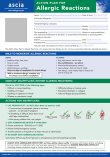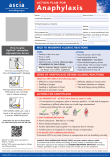Allergy tips for school children
Key points about allergy tips for tamariki starting school
- Starting school well takes extra planning for children with allergies.
- Here are some tips to help make kura a safe place for your child with an allergy.
- Make sure everyone knows what to do to reduce risk and how to handle any reactions.
- Prepare for starting school ahead of time. It's important to communicate with, and educate, everyone who will be involved with your child.

Check your medicines and action plans are up to date and take time to visit the school before your child starts.

Image credit: Canva
Communicate with the school
- Tell the school about your child's allergy as early as possible. Be clear about which foods or other allergens may trigger an allergic reaction.
- Visit the school and ask about potential risks. For example:
- Are children exposed to food allergens during cooking and craft lessons?
- Is there a school policy about children sharing food?
- How do they make sure that relieving teachers, tuck shop staff and before/after school carers are familiar with student's needs?
- Provide the school with an up-to-date action plan from your healthcare provider. This should include:
- details of prescribed medicines, such as adrenaline or antihistamines
- a recent photograph of your child.
- Make sure appropriate staff members are trained, and confident to administer medicines at the first sign of an allergic reaction.
- For anaphylactic reactions, Allergy New Zealand provide free trainer EpiPens® for anyone to practice with or schools can sign up to MyEpiPen®(external link) to request a trainer pen.
Prepare your child to start school
You can prepare your child to start school by teaching them how to recognise what they are allergic to, not to swap or share food, to keep their hands out of their mouth and what to do if they have a reaction.
- Teach your child not to put their hands in their mouth, and to wash their hands with soap and water if they get food on their skin.
- Provide a lunchbox that is clearly labelled with their name. Be creative in providing safe food treats for your child.
- Teach them not to accept food from others and why this is important.
- Teach them not to share water bottles as another person may have recently eaten a food containing something your tamariki is allergic to.
- For the same reason, teach your child not to put their mouth directly on the drinking fountain and to let water run over the bubbler before drinking from it.
- Provide your child with their own pens and pencils and make sure they don't share them. Some children suck these, putting your child at risk.
- Encourage your child to become independent. Some children are comfortable taking their adrenaline auto-injector (such as an EpiPen) with them wherever they go. It can be kept in an insulated lunch bag, together with a copy of the emergency action plan. You could also discuss the option of wearing a medical information bracelet or chain with your child.
When your child starts school you can talk to your child’s teachers and relevant staff about where the action plan and medicines will be kept, classroom policies around pens/pencils, rainy day lunches, food sharing, and trips away from school.
Communicate with teachers and staff
- Supply necessary medicine and ensure it is clearly labelled and stored correctly.
- Make sure teachers (including relief teachers, before/after school carers and other staff) are aware of how to prevent and treat allergic reactions and will act if needed.
- Ask teachers to encourage handwashing with soap and water after breaks to remove allergens from the skin.
Plan for special events
- Ensure your child or the teacher carries the emergency kit on school excursions, sports days and special days.
- Remind teachers and other carers of the importance of having a mobile phone for emergency contact when away from school.
- Find out if your child’s class is likely to have treats for special occasions or birthdays and if so, leave some safe options for your child with their teacher.
- Record and check expiry dates of auto-injectors used at school and at home.
- Ensure each unit is replaced before it expires.
- Take medicines home at the end of each school year to have for backup for the holidays.
- Inform the school of any changes in contact phone numbers.
- Revise the action plan annually or sooner if there has been:
- a change in your child's condition
- an at-risk situation
- an anaphylactic reaction.
The following links provide further information about allergy tips for school children. Be aware that websites from other countries may have information that differs from New Zealand recommendations.
Allergy awareness resource for primary years(external link) Allergy & Anaphylaxis Australia
Going to school with food allergies(external link) Auckland DHB & Starship Children's Health, NZ
Resources
Allergy awareness resource for primary years(external link) Allergy and Anaphylaxis Australia
Primary school information – a teachers resource(external link) (Activities for Years K-2, Activities for Years 3-4, Activities for Years 5-6) Allergy and Anaphylaxis Australia
Allergies(external link) Health Information Translations, US, 2016 English(external link), Arabic(external link), Chinese (simplified)(external link), French(external link), Hindi(external link), Japanese(external link), Korean(external link), Nepali(external link), Russian(external link), Somali(external link), Spanish(external link)
Allergy and Anaphylaxis. Guidelines for Schools and Kura 2023(external link) Allergy NZ, 2023
Be a M.A.T.E, making allergy treatment easier(external link) Allergy and Anaphylaxis Australia, 2013
References
- Managing allergies and anaphylaxis in schools and preschools – a collaborative partnership(external link) Allergy New Zealand, 2023
- Allergy awareness resource for primary years(external link) Allergy & Anaphylaxis Australia
- Going to school with food allergies(external link) Auckland District Health Board & Starship Children's Health, NZ, 2015
Brochure

Australasian Society of Clinical Immunology & Allergy, Australia, 2025

Australasian Society of Clinical Immunology and Allergy, Australia, 2025
English, Arabic(external link), Chinese Traditional(external link)
Credits: Healthify editorial team. Healthify is brought to you by Health Navigator Charitable Trust.
Reviewed by: Dr Jan Sinclair, Paediatrician, Starship Hospital
Last reviewed:





